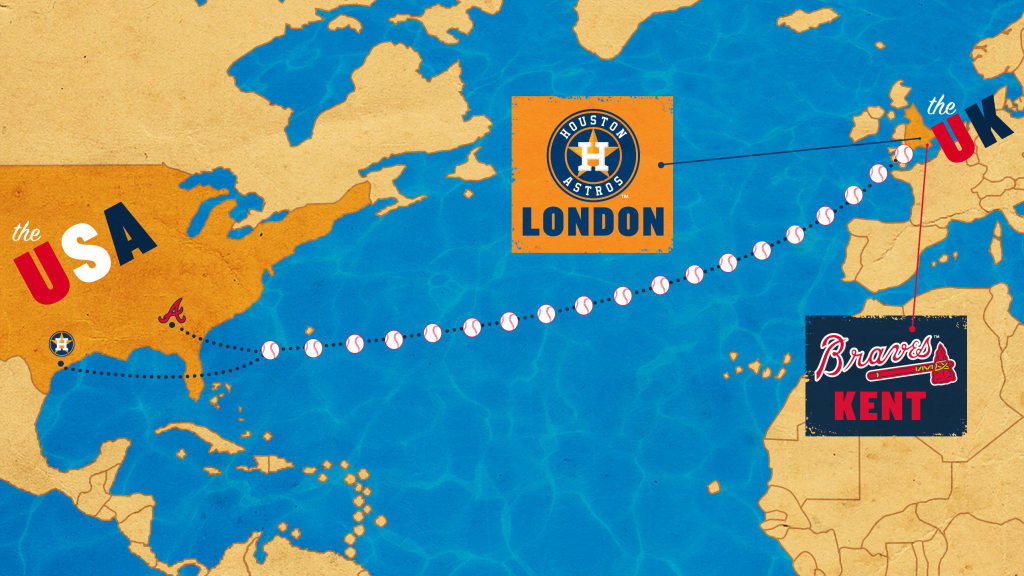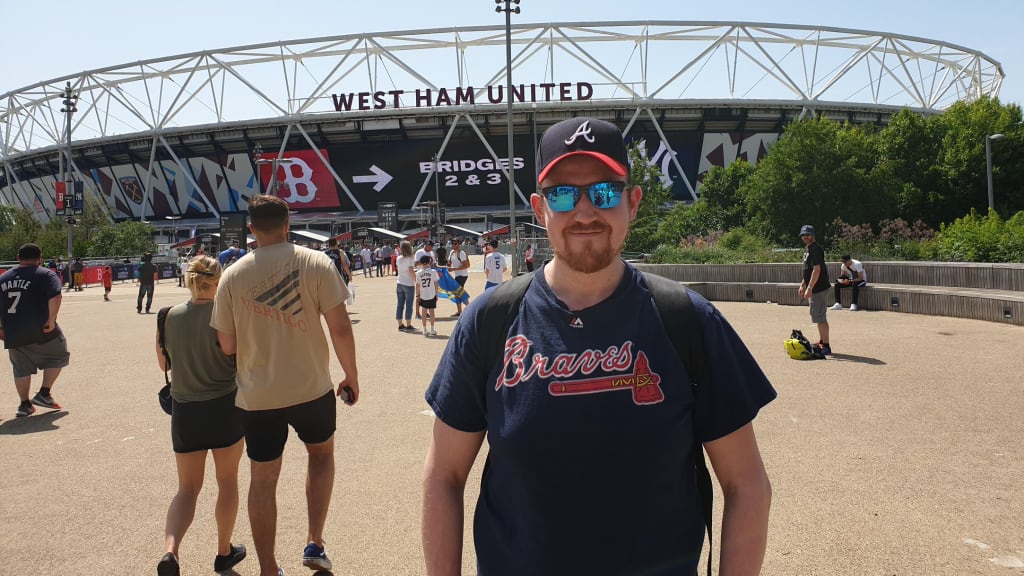
"Talk about repressed memories," Bob Bamber -- better known to his followers as @BravesInTheUK on Twitter -- tells me in a recent Zoom call. We're talking about Game 5 of the 2019 NLDS, when Atlanta gave up 10 runs to the Cardinals before ever getting a chance to hit.
With that game starting around 10 p.m. in the United Kingdom, Bamber said he squeezed in a nap beforehand and then ordered a pizza around 9:30 to munch on while watching.
"Basically, the horror story was that the pizza arrived at like 25 past 10," Bamber said. "The Cardinals had already scored eight runs by that point, and it was like, 'Game's over, season's over.' I ate the pizza with tears in my eyes. And then I was asleep by half past 11."
(Don't worry -- he made up for it in 2020 when the Braves advanced past the Reds in the Wild Card Series.)
That's life when you love a Major League Baseball team while living in the U.K., trying to follow along across an ocean and multiple time zones. Your baseball fandom features pregame naps (hey, most athletes do that, too), alarms set for the middle of the night and, when celebrating, trying to remain as quiet as possible.
Bamber slept through most of this year's NLCS, but woke up during the sixth inning of Game 6. Seeing the Braves with a lead and a chance to clinch the pennant, he decided to stay up for the rest of the game. Then, after Luke Jackson gave up a run to make it 4-2, he thought, "Oh god, I should have stayed in bed."
The Braves held on for the victory, but even then, Bamber couldn't cheer.
"It's 4 in the morning. I'm in a block of flats with like 30 people in it," Bamber said. "You just can't make a noise."

It's not the easiest decision to become a fan of baseball in England. If you didn't grow up following the sport, it takes a fair amount of work to latch onto. The newspapers aren't printing the daily box scores and people aren't chatting about baseball every night at the pub. After visiting the U.S. in 2016 -- seeing games in Miami and Atlanta -- Bamber got on board.
"I'd made the decision to pick Atlanta as my team three weeks before I could reliably tell you who Freddie Freeman was," Bamber joked.
Some -- like Astros fan George Martin (@AstrosFansUK), one of the MLB U.K. Fan community leaders -- fell in love with the sport while watching Channel 5's late-night broadcasts during the late '90s and early aughts. Eschewing the "glory hunting" option meant the Yankees were out, so it fell to Houston. Martin loved the talented team that featured the "Killer B's" -- though it was pitcher Mike Hampton and his impressive hitting ability that put them over the edge.
"Lo and behold, before the next season -- 2000 -- he got traded to the Mets, so I had a decision to make," Martin said. "I thought, 'Do I stick with the Astros or do I follow Mike Hampton? You know what, players are going to come and go. I've made my choice with the team.' And 21 years later, here I am."
Martin -- who's been surviving on about three hours of sleep a night when Houston has played this postseason -- is working on roping his 6-year-old son into baseball fandom. He also thanks social media for helping him stick with the team during its lean, rebuilding years.
"Honestly, when I first went on to Twitter, it was late 2013," Martin said. "It was an absolute godsend because I felt that I was losing track of what was going on with the Astros over the years. I thought it was harder and harder to put that effort into keep doing it."
Instead, Martin can now connect with Astros fans all over the world and chat about the team in real time -- something that is a little difficult to do when postseason games are going on while everyone you know is asleep.
The day-to-day nature of the regular season is also a bit of a blessing and a curse. Tell a fan in Europe or the U.K. to get into the NFL and they know they need to make time for one game a week. Tell a new fan that their baseball team plays almost every night for six months, and it's a little more complicated. Still, accepting that you can be a diehard fan even if you're not watching every game allows baseball to simply become a part of your life.
"My brain is tuned to wake me up at 3 in the morning -- not necessarily to watch the end of games, but at least there's baseball going on," Bamber said. "So there's an ongoing argument between me and my Amazon Alexa. I'll shout out, 'What's the Braves score?' and it'll tell me something about archery from last year.
"But it's more just following [the team], keeping tabs on them, and then yeah, when you hit the postseason, things get a little bit different," Bamber said.
There is still that drive to create an in-person fan community, though, and it's something that Martin, and the other fans like Bamber who run U.K. fan accounts, work hard to do. They'll host meetups at places like Home Run House -- London's dedicated baseball bar -- where fans from around the country can come together and watch.
"We try to have different games which broadcast at the same time so people can watch more than one game," Martin said. "Have a drink, have food and talk about baseball, which, over here, a lot of people didn't realize was an option. People were thinking, 'Am I the only one watching this sport in this country?' For years, I thought I might be the only Astros fan in Britain. And I'm very, very glad to know that I'm not."
Martin is also very conscious that sports and sporting communities can be very intimidating to an outsider. He wants the British baseball community to be a warm and welcoming place, whether you've been a fan your entire life or you simply thought catching a ballgame might be a fun way to spend a few hours.
"It's not a clique; it's not a closed shop," Martin said. "We welcome old and new fans alike. It sounds cliche, but it's the absolute truth. We really do want to expand. We don't want it to be the same demographic of people. We don't want it to be your stereotypical white male, 25 to 35 years old and that's it. We want to welcome kids, we want to welcome women on board, we want to welcome more international fan bases."
Both Martin and Bamber will be watching the rest of the World Series from their homes in London and Kent, respectively, doing their best to keep their eyes open in the very early morning hours. But should their team win it all, they'll be celebrating ... very carefully.
"I don't want to jinx it, but if we win the World Series, I will be struggling to not wake up my family," Martin said. "I'd get in a lot of trouble. So I'll be doing a lot of fist bumps with silent screams of joy."
